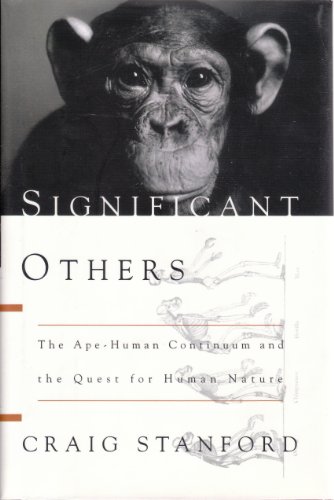
Synopsis
"synopsis" may belong to another edition of this title.
About the Author
Craig B. Stanford is a renowned specialist in human origins and primate behavior who splits his time between Uganda and Los Angeles, California. He is Co-Director of the Jane Goodall Research Center, Director of the Bwindi-Impenetrable Great Ape Project in Bwindi-Impenetrable National Park, Uganda, and Associate Professor of Anthropology at the University of Southern California. His previous books include The Hunting Apes and Chimpanzee and Red Colobus.
Reviews
"Apes and humans are cut from the same evolutionary cloth; all that fundamentally distinguishes us is posture, we being upright walkers and the apes quadrupeds. Everything else, from the size and function of our brains to the other aspects of our shared anatomies, is a difference of degree and not of kind." In eloquently laying out his argument, Stanford touches on many elements of modern anthropology, including its disagreements. Serving simultaneously as associate professor of anthropology at the University of Southern California, co-director of the Jane Goodall Research Center there and director of the Great Ape Project in Uganda's Bwindi Impenetrable National Park, he brings a rich background to his presentation.
Editors of Scientific American
Perfectly complementing Frans de Waal's magisterial The Ape and the Sushi Master [BKL Mr 1 01], Stanford homes in on the relationships between apes and humans, contending that "to understand human nature, you must understand the apes." In the book's first part, he shows that what has been learned about how ape societies handle food seeking, reproduction, and child rearing enlightens us about how early hominids behaved, why such traits as higher intelligence developed, and why certain problematic behaviors, such as infanticide, are so persistent. The second part takes up language, considered a sine qua non of humanity but which apes have modestly mastered; species' disparate language capabilities, Sanford says, should be investigated to discover "what adaptive problems are solved through the use of language." But nothing will be learned if the great apes die out, and in the concluding chapters, Stanford pleads for them, drawing on his experience in the field observing chimpanzees and mountain gorillas. And so science segues to advocacy, potently ending a cogent and absorbing book. Ray Olson
Copyright © American Library Association. All rights reserved
"About this title" may belong to another edition of this title.
Other Popular Editions of the Same Title
Search results for Significant Others: The Ape-Human Continuum And The...
Significant Others: The Ape-Human Continuum And The Quest For Human Nature
Seller: World of Books (was SecondSale), Montgomery, IL, U.S.A.
Condition: Very Good. Item in very good condition! Textbooks may not include supplemental items i.e. CDs, access codes etc. Seller Inventory # 00091861233
Significant Others: The Ape-Human Continuum And The Quest For Human Nature
Seller: Wonder Book, Frederick, MD, U.S.A.
Condition: Very Good. Very Good condition. Like New dust jacket. A copy that may have a few cosmetic defects. May also contain light spine creasing or a few markings such as an owner's name, short gifter's inscription or light stamp. Seller Inventory # M14R-00336
Significant Others: The Ape-Human Continuum And The Quest For Human Nature
Seller: Wonder Book, Frederick, MD, U.S.A.
Condition: Good. Good condition. Good dust jacket. A copy that has been read but remains intact. May contain markings such as bookplates, stamps, limited notes and highlighting, or a few light stains. Bundled media such as CDs, DVDs, floppy disks or access codes may not be included. Seller Inventory # Q12C-02128
Significant Others : The Ape-Human Continuum and the Quest for Human Nature
Seller: Better World Books, Mishawaka, IN, U.S.A.
Condition: Very Good. Used book that is in excellent condition. May show signs of wear or have minor defects. Seller Inventory # 12366519-6
Significant Others : The Ape-Human Continuum and the Quest for Human Nature
Seller: Better World Books, Mishawaka, IN, U.S.A.
Condition: Good. Former library book; may include library markings. Used book that is in clean, average condition without any missing pages. Seller Inventory # GRP102364182
Significant Others: The Ape-Human Continuum And The Quest For Human Nature
Seller: ThriftBooks-Atlanta, AUSTELL, GA, U.S.A.
Hardcover. Condition: Very Good. No Jacket. May have limited writing in cover pages. Pages are unmarked. ~ ThriftBooks: Read More, Spend Less. Seller Inventory # G0465081711I4N00
Significant Others: The Ape-Human Continuum And The Quest For Human Nature
Seller: The Book Cellar, LLC, Nashua, NH, U.S.A.
hardcover. Condition: Good. Some wear, but still a good reading copy. Has slight water damage that does not affect readability of the book.Over 1,000,000 satisfied customers since 1997! Choose expedited shipping (if available) for much faster delivery. Delivery confirmation on all US orders. Seller Inventory # 10632505
Significant Others: The Ape-Human Continuum And The Quest For Human Nature
Seller: HPB-Diamond, Dallas, TX, U.S.A.
Hardcover. Condition: Very Good. Connecting readers with great books since 1972! Used books may not include companion materials, and may have some shelf wear or limited writing. We ship orders daily and Customer Service is our top priority! Seller Inventory # S_343877222
Significant Others: The Ape-Human Continuum And The Quest For Human Nature
Seller: HPB Inc., Dallas, TX, U.S.A.
hardcover. Condition: Very Good. Connecting readers with great books since 1972! Used books may not include companion materials, and may have some shelf wear or limited writing. We ship orders daily and Customer Service is our top priority! Seller Inventory # S_442050083
Significant Others: The Ape-Human Continuum and the Quest for Human Nature
Seller: N. Fagin Books, Chicago, IL, U.S.A.
Hardcover. Condition: Very Good. Dust Jacket Included. 2001. Physical anthropology, Evolutionary studies, primate studies. Basic Books. Very good boards and good+ dust jacket 236p. Seller Inventory # 21434

